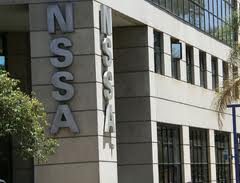
NSSA’s compliance inspectorate is currently visiting business premises to verify employers’ compliance with the national Pension and Other Benefits Scheme and Worker’s Compensation Insurance Fund regulations.
What this means is that NSSA inspectors wish to check that employers are registered and up-to-date with their remittance of contributions and premiums to the Pension and Other Benefits Scheme and Worker’s Compensation Insurance Fund schemes.
This exercise is conducted every year. This year NSSA has widely advertised the dates on which it is conducting it, namely between February 1 and March 31.
The advertisement also gave those who may be in arrears the opportunity to make payment arrangements by February 15. It provided the names, mobile phone numbers and e-mail addresses of the principal inspector or administrator at NSSA branches throughout the country to facilitate this.
Those who failed to take advantage of this opportunity were warned they could not expect any favourable consideration when it came to the application of surcharges and penalties.
Every employer is obliged by law to register his/her business and employees with the National Social Security Authority and to remit contributions to the Pension and Other Benefits scheme and premiums to the Worker’s Compensation Insurance Fund (WCIF) by the 10th of each month.
The only exceptions are informal sector employers and employers of domestic workers, since those sectors are not as yet covered by the schemes.
Half of the pension scheme contribution is deducted from the employee’s salary each month. The other half is paid by the employer. The WCIF contribution is paid by the employer alone.
- Chamisa under fire over US$120K donation
- Mavhunga puts DeMbare into Chibuku quarterfinals
- Pension funds bet on Cabora Bassa oilfields
- Councils defy govt fire tender directive
Keep Reading
Employers are also required to notify NSSA in writing of changes in their business details and in the employment status of their employees.
NSSA inspectors carry with them their certificate of appointment by the Minister of Labour and Social Welfare which are issued by the NSSA General Manager.
Employers are entitled to ask an inspector to produce this certificate to verify his/her identity.
Inspectors are empowered to inspect any premises where there is cause to believe there are employees who should be covered by the two social security schemes in order to register unregistered employers and employees and enforce payment of contributions and premiums.
They are entitled to make any enquiry they consider necessary to establish that the regulations governing the schemes are being complied with.
They may ask employers to produce any books, registers, accounts, monthly returns, receipts, computer databases and documents relevant to the schemes. They are entitled to copy relevant documents. Employers should keep records with relevant information about each employee that they may have to produce on demand to NSSA inspectors.
There are forms to complete and return each year in respect of both the pension scheme and the Worker’s Compensation Insurance Fund.
The end of year return form for the pension fund is the P16 form. Its purpose is to reconcile payments made during the year to facilitate the crediting of individual accounts. The WCIF return is form WC50.
The P4A monthly remittance form stipulates the monthly wage bill, insurable earnings, number of employees, pension contribution and WCIF premium, but does not include the names of employees. The names of employees are provided when they register.
If they cease to be employed by the employer, then the employer is expected to notify NSSA of this by completing form P4c.
The form P16 provides details of each employee’s employment period and the contribution made.
New employers are required to register within 30 days of becoming an employer by completing and submitting to NSSA form P2 and to ensure that each employee completes a form P3 employee registration form.
NSSA notifies the employer of his/her social security registration number (SSR number) and employer industry code (EC). The employee is allocated a social security number, which remains the same for life.
Employees who have not been advised of their social security number can, if their employer does not have it, obtain it from their nearest NSSA office. They will need to provide their national identity card to enable NSSA to obtain their social security number for them.
All forms can be obtained from NSSA offices or be downloaded from the NSSA web-site (www.nssa.org.zw)
What the inspectors visiting businesses over February and March are chiefly checking on is whether contributions and premiums are up-to-date. Employers should have their NSSA payments receipts and wages records readily available to facilitate the exercise.
Those who are behind with their payments would be well advised to bring their payments up-to-date before an inspector arrives at their premises, even if they have not met the February 15 deadline. Employers who have not registered their business or employees would likewise be well advised to do so as soon as possible.
Failure to comply with regulations set out in statutory instruments governing the two social security schemes is a criminal offence, which means prosecution, in addition to financial penalties and surcharges, could ensue. Conviction could result in a fine or imprisonment or both, a situation no employer would want to find himself in.
Talking Social Security is published weekly by the National Social Security Authority as a public service. There is also a weekly radio programme, PaMhepo neNssa/Emoyeni le NSSA, discussing social security issues at 6.50 pm every Thursday on Radio Zimbabwe.
Readers can e-mail issues they would like dealt with in this column to [email protected] or text them to 0735 041 278. Those with individual queries should contact their local NSSA office or telephone NSSA on (04) 706517-8 or 706523 5.











